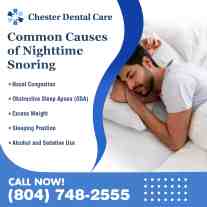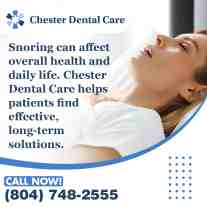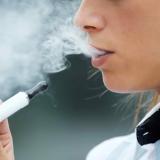Snoring disrupts sleep for many individuals and their partners, often leading to daytime fatigue, irritability, and long-term health risks. In Chester, Virginia, many residents experience chronic snoring due to nasal congestion, obesity, alcohol use, or structural airway issues. While occasional snoring may be harmless, persistent snoring can indicate obstructive sleep apnea, a condition linked to high blood pressure, heart disease, and impaired cognitive function. Without proper intervention, snoring can worsen over time, negatively affecting both personal health and relationships.
Chester Dental Care offers treatments for snoring that address its root causes. Using a multidisciplinary approach, the clinic provides oral appliances, NightLase® laser therapy, myofunctional therapy, and airway orthodontics to improve airflow and reduce snoring. These solutions help patients breathe more easily and achieve restful sleep without relying on invasive procedures. By identifying the cause of snoring and implementing personalized treatments, Chester Dental Care helps individuals regain control of their sleep and overall well-being.
Key Takeaways
Blocked airways are the main cause of snoring. Factors like nasal congestion, obesity, and relaxed throat muscles contribute to snoring by restricting airflow during sleep.
Lifestyle changes can reduce snoring. Losing weight, adjusting sleep positions, avoiding alcohol before bed, and practicing snoring treatment exercises help minimize snoring naturally.
Medical treatments for snoring are available. Snoring Laser Treatment, oral appliances, and exercise options can help individuals with severe snoring or sleep apnea.
Snoring treatment at home includes hydration and humidifiers. Dry air and dehydration make snoring worse. Using a humidifier and staying hydrated can improve airflow and reduce nighttime noise.
Ignoring snoring can lead to health risks. Chronic snoring may indicate sleep apnea, which is linked to high blood pressure, heart disease, and daytime fatigue. Seeking professional guidance provides better sleep and overall health.

What Causes Snoring?
Snoring occurs when airflow is partially blocked during sleep, causing vibrations in the throat tissues. Several factors contribute to snoring, including:
1. Nasal Congestion and Allergies
Blocked nasal passages force air through a smaller opening, increasing vibrations in the throat. Allergies, colds, or sinus infections can lead to temporary snoring.
Solution: Keeping nasal passages clear with a humidifier, nasal strips, or saline sprays can help reduce snoring.
2. Sleeping Position
Sleeping on the back causes the tongue and soft tissues to collapse toward the throat, partially blocking the airway. This increases the likelihood of snoring.
Solution: Side-sleeping helps keep the airway open, reducing snoring frequency and intensity.
3. Obesity and Excess Weight
Excess fat around the neck puts pressure on the airway, making it more likely to collapse during sleep. Studies show that overweight individuals are more likely to experience snoring and sleep apnea.
Solution: Losing weight through diet and exercise can reduce airway obstruction and improve sleep quality.
4. Alcohol and Sedatives
Alcohol and sedatives relax throat muscles, increasing the risk of airway obstruction and snoring.
Solution: Avoiding alcohol and sedatives before bedtime helps maintain normal muscle tone in the throat.
5. Structural Abnormalities
A deviated septum, enlarged tonsils, or a long soft palate can contribute to snoring by narrowing the airway.
Solution: In some cases, surgical intervention may be necessary to correct structural issues.
6. Sleep Apnea
Loud, chronic snoring may indicate obstructive sleep apnea, a condition where breathing repeatedly stops during sleep. Sleep apnea can lead to serious health complications, including high blood pressure and heart disease.
Solution: A sleep study can diagnose sleep apnea, and treatment options include Vivos treatment, oral appliances, and lifestyle changes.
Treatments for Snoring
Several treatments for snoring can help reduce nighttime disturbances and improve breathing. Options range from lifestyle adjustments to medical interventions.
1. Lifestyle Changes
Weight Loss: Reducing excess weight decreases throat fat and improves airflow.
Sleep Position Adjustment: Sleeping on the side rather than the back prevents airway collapse.
Avoiding Alcohol Before Bed: Limiting alcohol intake helps maintain throat muscle tone.
Using a Humidifier: Dry air irritates nasal passages; a humidifier adds moisture to improve breathing.
2. Snoring Treatment at Home
For mild cases, home remedies can help reduce snoring.
Nasal Strips or Dilators: These open nasal passages to improve airflow.
Elevating the Head: Using a thicker pillow or an adjustable bed can reduce airway obstruction.
Saline Rinse: Clearing nasal congestion with a saline spray can improve breathing.
Herbal Remedies: Peppermint oil or eucalyptus steam inhalation may reduce nasal inflammation.
3. Snoring Treatment Exercises
Strengthening throat and tongue muscles can prevent airway collapse. Research suggests that daily exercises can reduce snoring frequency and severity.
Effective Exercises Include:
Tongue Slide: Place the tip of the tongue behind the top front teeth and slide it backward along the roof of the mouth. Repeat 20 times.
Mouth Stretch: Open the mouth wide and hold for 5 seconds. Repeat 10 times.
Humming Exercises: Singing or humming strengthens throat muscles and reduces snoring.
4. Medical Snore Treatments
At Chester Dental Care, we use a multidisciplinary approach to address snoring and mild to moderate sleep apnea. Our snore treatments include:
1. Oral Appliances
Custom-fitted oral appliances reposition the jaw to prevent airway collapse. Vivos appliances help expand the jaw, straighten teeth, and improve airway function, reducing snoring and sleep-disordered breathing.
2. Snoring Laser Treatment (NightLase® Therapy)
NightLase® therapy is a non-invasive laser treatment that tightens oral tissue to improve airflow. This procedure uses Fotona laser technology, which gently heats the oral mucosa, promoting collagen contraction. Research shows that NightLase is highly effective in reducing snoring and improving sleep quality.
3. Myofunctional Therapy
This therapy focuses on exercises that strengthen the muscles of the mouth, tongue, and throat. Proper tongue posture and nasal breathing can improve airflow, reducing snoring naturally. Myofunctional therapy has been shown to help with other types of sleep-disordered breathing as well.
4. Airway Orthodontics
Misaligned teeth and narrow jaws can restrict airflow. Airway orthodontics analyzes a patient’s anatomy and breathing patterns to create a treatment plan that supports whole-body wellness. Benefits include:
Improved airflow
Proper jaw positioning
Balanced facial structure
Stable upper cervical spine
Natural Treatment for Snoring
For those seeking natural treatment for snoring, Chester Dental Care recommends:
Changing Sleep Position: Sleeping on the side prevents airway blockage.
Using a Humidifier: Moist air reduces nasal congestion and improves airflow.
Avoiding Alcohol and Sedatives: These substances relax throat muscles and worsen snoring.
Practicing Snoring Treatment Exercises: Strengthening throat and tongue muscles can improve airflow.
Staying Hydrated: Dehydration thickens mucus, increasing snoring.
The Importance of Treating Snoring
Snoring is more than a nighttime nuisance; it can indicate serious health concerns. Studies show that chronic snorers are more likely to develop high blood pressure, heart disease, and daytime fatigue. According to the American Academy of Sleep Medicine, approximately 40% of adult men and 24% of adult women snore regularly.
Ignoring snoring can lead to long-term complications, including:
Increased risk of stroke and heart disease.
Poor sleep quality leads to daytime drowsiness and decreased productivity.
Strained relationships due to disrupted sleep for partners.
When to Seek Professional Help
If snoring is loud, persistent, and accompanied by gasping or choking sounds, it may indicate sleep apnea. Other warning signs include excessive daytime sleepiness, headaches, and difficulty concentrating.
A professional evaluation can determine the cause of snoring and recommend effective snore treatments. Chester Dental Care, the trusted dental clinic, offers personalized solutions, including oral appliances and modern treatments when necessary.
Snoring is a widespread issue that affects a significant portion of the adult population. Here are some key statistics:
Prevalence: As per the Sleep Foundation’s website, approximately 44% of adult men and 28% of adult women between the ages of 30 and 60 are habitual snorers.
Age Factor: Younger adults aged 18–24 years are less likely to report snoring, with a prevalence of 25.6%.
Impact on Partners: Among those who share a bed with a snorer, 75% report that the snoring affects their sleep, and 77% say it impacts their well-being in some way.
Health Implications: Snoring is a common symptom of obstructive sleep apnea (OSA), a sleep disorder that, if left untreated, can lead to serious health issues such as high blood pressure, heart disease, and stroke.
These statistics highlight the importance of recognizing and addressing snoring for personal health, the well-being of partners, and overall quality of life.
Could Your Snoring Be a Sign of Something More?
Here are some examples:
Exhausted Parents? – You go to bed early but still wake up drained. Your partner mentions your loud snoring and pauses in breathing. If this sounds familiar, it’s time to get evaluated. Sleep apnea could be affecting your energy, and an oral appliance might help.
Struggling to Focus at Work? – If you’re dozing off in meetings, waking up with headaches, or feeling foggy all day, your snoring could be a sign of sleep apnea. A professional evaluation can identify the cause and help you get the rest you need to perform at your best.
Keeping Your Partner Awake? – If your snoring is so loud that your spouse sleeps in another room, it’s worth looking into. Snoring and gasping for air at night could indicate a deeper issue. A dental consultation could lead to a simple solution that benefits both of you.
Noticing a Drop in Performance? – Whether you’re an athlete or just active, poor sleep can take a toll. If you’re feeling sluggish, snoring heavily, and waking up unrefreshed, a sleep evaluation can help uncover the problem and get you back to peak performance.
Struggling in Class? – If you’re constantly tired, can’t concentrate, and your roommate complains about your loud snoring, don’t ignore it. Snoring and sleep disruptions can impact your studies. Getting evaluated could lead to a simple fix that improves your energy and focus.
If any of these sound like you, a professional evaluation can determine the cause and recommend the right snore treatment. Chester Dental Care offers personalized solutions from oral appliances to laser treatments.

Frequently Asked Questions
What are the most effective treatments for snoring?
At Chester Dental Care, we provide treatments for snoring that include oral appliances to improve airflow. Lifestyle adjustments, sleep position changes, and medical options like Vivos treatment can also help reduce snoring.
Can treatments for snoring help with sleep apnea?
Yes, our treatments for snoring at Chester Dental Care can also improve sleep apnea symptoms. Oral appliances adjust the jaw position to keep the airway open, reducing snoring and breathing disruptions.
Are there any at-home treatments for snoring?
Chester Dental Care recommends at-home treatments for snoring, such as using a humidifier, staying hydrated, and doing snoring treatment exercises to strengthen throat muscles. Avoiding alcohol before bed and adjusting sleep positions can also help.
How do oral appliances work as treatments for snoring?
Our oral appliances at Chester Dental Care reposition the jaw to keep the airway open. These devices are comfortable, easy to wear, and a good alternative to CPAP therapy for those looking to reduce snoring.
When should I seek professional treatment for snoring?
If snoring affects sleep quality or causes tiredness during the day, Chester Dental Care recommends seeking treatments for snoring. Long-term snoring may be linked to other health concerns, making early care important.
Take Control of Your Sleep
Snoring can impact both sleep quality and overall health. Identifying the underlying cause and using effective treatments for snoring can lead to better rest and improved well-being. Chester Dental Care provides customized snore treatments to help patients breathe easier and sleep more soundly. Schedule an appointment today. Call us at (804)748-2555 or email frontdesk@chesterdentalcareva.com



